
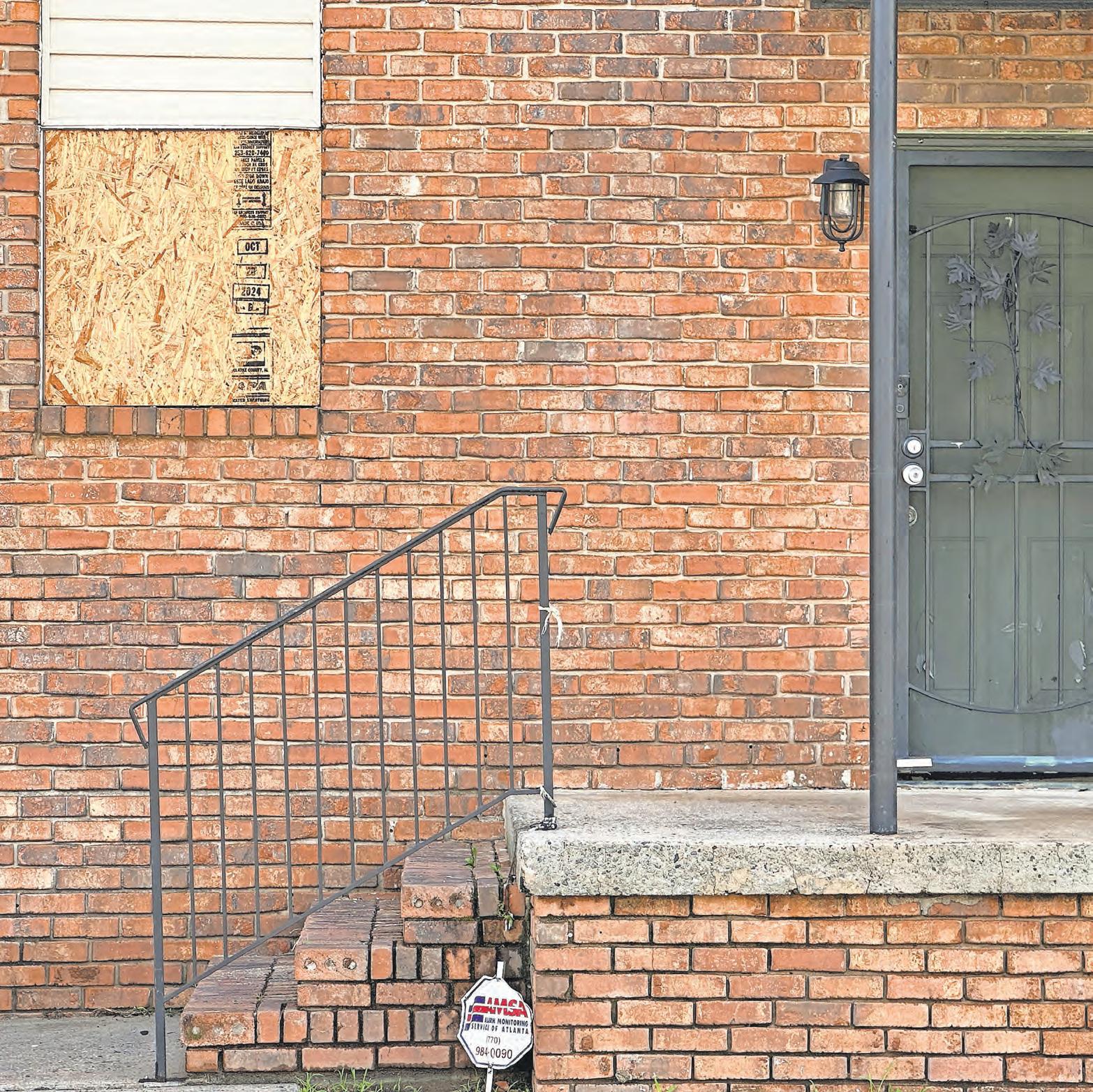



By DONNELL SUGGS
There’s an entire piece of a roof missing on one building. On others, there are either windows panes missing entirely or boarded-up windows. Online complaints on the Clayton County Code Enforcement app, Click Clayton, talk of rat-infested apartments, terrible customer service, and being tricked into renting subpar apartments after being shown the models during tours.
The Tara Woods apartment complex in Jonesboro has been in the news before. In July 2023, the Clayton County Water Authority cut off the water services due to an unpaid balance. The landlord/owner of the property at that time was Red Apple Group, Inc., a New York-based real estate and energy company. Red Apple Group, Inc. paid the balance five days after the water was shut off, but that was after residents, some of whom paid their rent, were subjected to having to temporarily move out of their apartments.
Tara Woods is back in the pages of The Atlanta Voice, but this time for blight. A new three-part series of housing stories on metro Atlanta apartment buildings that are in disrepair, and worse, Urban Blight, begins with Tara Woods.
Forbix, a Los Angeles-based real estate lender, foreclosed on the property and took over ownership not long after. Ventana Capital is the targeted next owner of Tara Woods, but that transaction is going to take some doing, according to Jules Stein, Ventana Capital’s managing advisor of supportive housing.
Financing is at the heart of any real estate deal. Whether it’s a loan to support some of the cost of purchasing property or money to go towards what needs to be done in order to bring a property up to snuff. In the case of Tara Woods, it is the latter. Ventana Capital will need several million dollars in order to fix what is wrong inside Tara Woods.
“Hopefully, within the next 45 days, we will have the funding in place, and we will begin to make a difference,” Stein said.
Listings on the Tara Woods apartments website and on Apartments.com have 2-3 bedroom apartments listed between $1,295 and $1,495. The average cost of a one-bedroom apartment in Atlanta is now $1,758, according to data provided by RentCafe.com.
So an apartment at Tara Woods, which is located a few feet from Tara Blvd., a busy intrastate highway that is a few miles from I-75 and minutes from Hartsfield-Jackson Atlanta International Airport, feels like a steal.
The photos of the apartments on the Tara Woods apartments website show brightly lit rooms, clean floors, and new appliances. The reality for residents of Tara Woods is much different. On a walk through the apartment complex on Tuesday, May 20, the on-site management office was closed. A sign in the window made that point clear.
Phone calls to the Tara Woods management

about whether there are plans to do something about the condemned building were returned to The Atlanta Voice. According to an employee in the management office, there are plans for the demolition and rebuilding of the apartment building.
The Atlanta Voice also contacted Clayton County Code Enforcement by phone and via the Click Clayton app for information on whether or not Tara Woods is violating residential codes. By the time of the publication of this story, there has been no word from Clayton County Code Enforcement.
However, Jonesboro’s mayor returned a phone call regarding Tara Woods.
“We have to have protections in place so the counties can do what we need to do in cases like that,” Jonesboro Mayor Donya L. Sartor said. “There needs to be legislation that includes housing.”
Stein says if the deal goes through, Ventana Capital won’t handle the property and its residents the way previous ownership has done in the past.
“We’re going to do it right,” Stein told The Atlanta Voice by phone Tuesday afternoon.
“I can’t imagine that it will fall apart from here.”

By ITORO N. UMONTUEN
After much speculation, the 60th Mayor of Atlanta, Keisha Lance Bottoms, is announcing she will run for Georgia Governor in 2026. As of today, Bottoms is the most prominent Democrat to throw her name in the hat. She cites the need for a leader to address the chaos in Washington and support Georgians.
Over the last few months, Bottoms has mentioned she’s considering throwing her name into the proverbial hat. Today, that picture has become clearer. Bottoms believes she is best suited to address the doubt and uncertainty emanating from the federal government.
“The country and Georgians are facing a lot of uncertainty right now. There’s a lot of chaos coming out of Washington, D.C.,” says Bottoms. “People are frustrated, they are anxious, and they’re looking for a leader who’s going to fight on behalf of Georgians. And I’m that leader. And this is that time. This is a time that we all have to step up and do what we are best able to do. And for me, it’s leading, and it’s fighting, and that’s why I’m excited to announce this run for governor.”
Bottoms championed affordable housing, transparency in city government while
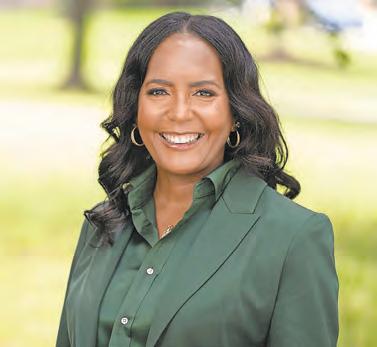
Bottoms says expanding Medicaid in Georgia is a chief priority. The Peach State is only one of nine states in the U.S. that has not expanded Medicaid. Georgia’s refusal to expand Medicaid has also seen nine rural hospitals shut their doors.
“We are leaving close to $710 million on the table,” Bottoms says. “300,000 Georgians don’t have health care because of our refusal to expand Medicaid.
Bottoms also says she wants to implement strategies to help small businesses thrive. She says this includes cracking down on corporate landlords and reducing housing costs. Coupled with that, she says, she will target corporate landlords who are buying up property that drives up rent and housing costs.
invest in education, including providing teachers with income tax breaks and ensuring access to quality education. She seeks to address the teacher shortage by investing in education and offering income tax breaks to teachers.
“We know that we continue to have a teacher shortage in this state, and what I know from my time serving as a judge, education impacts everything,” Bottoms says. “There’s a quote from Frederick Douglas that says ‘it’s far easier to raise strong children than to repair broken men.’
Bottoms is also an advocate for pathways to college and career training.
tackling various social justice issues during her time as Mayor.
Notably, Bottoms chose not to run for re-election in 2021. She became the first Atlanta mayor to not serve a second term since Sam Massell in 1973, after losing to Maynard Holbrook Jackson, Jr.
In 2022, Bottoms served as Senior Advisor to the President for Public Engagement within former President Joe Biden’s administration.

“Also, I want to focus on small businesses making sure that they have what they need to succeed in this state, and especially during this uncertain time, our small businesses employ close to 45% of Georgians. We want to make sure that people have what they need to start businesses, to scale businesses and to survive the uncertainty of these economic times.”
Plus, Bottoms emphasizes the need to
“I think it all speaks to how important education is in this state, and how I will really lean in and do everything that I can possibly do to make sure that our teachers are strong, our kids are strong, and our schools are strong.”
What does the data say?
Bottoms is very popular among Black women, the backbone and moral compass of the Democratic Party, and within Metro Atlanta. But, the key to Democrats’ success in 2026 will be performing very well in Middle and South Georgia.


By REV. DR. HEBER BROWN, III
Many in the nation are grappling with where we go from here.
There are fears of a recession, concerns about tariffs, and an administration that seems bent on skirting the rule of law. In this hour of great need, the Black church has an opportunity to reconfigure itself to better address the foundational needs of its people. This includes a more systematic approach to food security, a reimagining of youth and young adult ministries, an expansion of traditional church roles, and a broader view of health and wellness programs.
For instance, rather than thinking of our programs to feed persons in need as beginning and ending with food pantries, we can look to the model created by the entity I founded, the Black Church Food Security Network. Since the Black church is land-rich, the BCFSN advocates growing gardens on church grounds. We also work to support Black farmers and producers and connect them with Black congregations. We understand that if we have control over our food system, we can address food insecurity while also cultivating new relationships and skills.
Black churches have an opportunity to pursue critical opportunities that could lead to collective thriving. For example, trustee ministries could see the activation of church assets as an urgent part of their ministry today. Building on the traditional understanding of their role, they could think about their church as a laboratory that incubates and invests in the cultivation of Black genius. This would make it easier for changemakers (both in the congregation and community) to access the funds and facilities they need to launch what could be life-giving innovations.
We know that even blessings can come wrapped in painful packages. While we may not understand the depths of what is happening in the world, this moment presents a chance to reimagine. For instance, how can we invigorate our youth and young adult ministries? In addition to youth bible study, we could help young people make sense of and cope with the current socio-political environment. For instance, we are steps from summer’s doors, the Black church could host freedom schools.
Several years ago, I launched Orita’s Cross Freedom School. It was designed to facilitate intergenerational learning, community-building, and ingenuity. We wanted to feed the hearts and minds of children and youth. Freedom School should be a yearly occurrence, especially in this season.
There other ways that the Black church can invest in youth. Several years ago, when Gov. Ron DeSantis removed Black History from the AP curriculum, Faith in Florida, led by Pastor Rhonda Thomas, launched a Black history toolkit and encouraged congregations to teach Black history. The program involved more than 260 congregations from across the nation. Young people, including Rev. Thomas’ son, were often instructors. This was innovative, and it was attractive to young people who often complain that the church is not relevant to their day-to-day lives.
When it comes to church deacons, the transformation I’m describing involves deacons seeing themselves as serving the community, not just their unique congregation. The role of a deacon then would be far more comprehensive than making hospital calls or visiting the bereaved. What would it look like if deacons became sanctified
social workers and healers? What would it look like if deacons were sensitive to the ups and downs of their local community, not just their church?
A reconfiguration of health programs might look like connecting with physicians, therapists, community-based healers, and those who bring a holistic perspective to wellness. It would involve treating the whole person not just the presenting symptoms.
It has been said that when the nation catches a cold, Black communities have the flu. In other words, any issue impacting the broader population will have a more severe impact on Black communities. Therefore, our approach must be specific and it must be laser-like.
I want to be clear. I do not belong to the crowd that maintains that the church is perfect. It’s not. Yet for all of our challenges, there is still tremendous promise. Even if you cannot perceive the promise, never, for one second, believe that those who oppose progress, cannot see our potential and power. There is a reason that the enemies of our community often attempt to disrupt the peace of Black congregations. There is a reason, agents of chaos have used tools such as arson, harassment and intimidation to undermine or weaken the Black church. If those who oppose us see our strength, why don’t we?
As we navigate the coming months and years, the Black church should exercise creative freedom in how we see and serve our people. We should be expansive in our imagination, even as we question our roles and responsibilities. Although some have marked us as irrelevant and ineffective, our comeback story will be one for the books.
Rev. Dr. Heber Brown, III is an author, pastor and founder of The Black Church Food Security Network
FOUNDED
May 11, 1966
FOUNDER/EDITOR
Ed Clayton Immortalis Memoria
PUBLISHER/EDITOR
J. Lowell Ware Immortalis Memoria The Atlanta Voice honors the life of J. Lowell Ware.
PUBLISHER
Janis Ware
PRESIDENT/
GENERAL MANAGER
James A. Washington 2018-2024
EXECUTIVE ASSISTANT TO PUBLISHER
Chia Suggs csuggs@theatlantavoice.com
EDITOR IN CHIEF Donnell Suggs editor@theatlantavoice.com
GENERAL ASSIGNMENT REPORTERS Isaiah Singleton isingleton@theatlantavoice.com
Laura Nwogu lnwogu@theatlantavoice.com
EDITOR AT LARGE Stan Washington swashington@theatlantavoice.com
MANAGING EDITOR, DIGITAL Itoro Umontuen iumontuen@theatlantavoice.com
ADVERTISING, SALES & CIRCULATION
ADVERTISING ADMINISTRATOR
Chia Suggs advertising@theatlantavoice.com
CIRCULATION MANAGER Terry Milliner SALES
R.D.W. Jackson rdwadman@gmail.com
SUBMISSIONS editor@theatlantavoice.com
DIRECTOR OF PUBLIC RELATIONS
Martel Sharpe msharpe@theatlantavoice.com
CONTACT INFORMATION
633 Pryor Street, S.W. Atlanta, GA 30312 Office: 404-524-6426 info@theatlantavoice.com

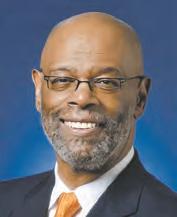
BY JAMES A. WASHINGTON
The Atlanta Voice
One of my struggles in my spiritual transformation has been how to serve. I mean, once you begin to understand the awesome nature and character of God, not only do you want to honor and praise His name, but you also want to begin to use the talents and gifts bestowed upon you as He would have you use them. For some, that became and still is a frightening undertaking, not because I lack the will, but more often than not, I don’t believe I’m worthy to carry out the Lord’s will. To think I might be selected for a specific mission by God can move me to denial. The good news is that I’m in great biblical company. My reaction certainly isn’t as significant as all of those individuals in the bible who, when confronted directly with God’s intention, suffered from extreme denial…“You talking to me?”
Now, before anyone starts to quote
And we know that in all things God works for the good of those who love Him, who have been called according to His purpose.
the vast number of saints who heard the Word and said yes, I’m not talking about refusing to be obedient. I’m talking about those like Moses, who initially tried to talk God out of selecting him to carry out God’s mission. A very close friend sent me one of those e-mail articles that make their way through cyberspace. It captured what I’m now dealing with regarding being a reluctant player in God’s great plan. It says, “God doesn’t call the qualified. He qualifies the call.” The point is that after all is said and done, if God wants me to do something, I will. I mean it’s
not like He will take no for an answer.
(See the bible under Moses.)
Even though I constantly think I should do more, I know I should write this column. I have been blessed with this platform and must use some of it to spread the gospel’s truth. I can no more deny this obligation than I could convince you that I don’t possess the gift of being able to write. This is a public acknowledgment that the gift is indeed a blessing and that blessing comes straight from God. The mystery of faith to me is no mystery. Christ died. Christ has risen. Christ will come
again. He is my Lord and Savior. Let me say I know I have been called. You have been too.
Romans 8:28 says, “And we know that in all things God works for the good of those who love Him, who have been called according to His purpose.” It says His purpose, not mine, and I love Him.” Therefore, I am obligated and quite pleased to serve. Thanks be to God.
May He bless and keep you always.
This column is from James Washington’s Spiritually Speaking: Reflections for and from a New Christian. You can purchase this enlightening book on Amazon and start your journey toward spiritual enlightenment.

“YOUR VOICE” What should President Trump do regarding the airplane Qatar is offering him, and what actions will he take?

FRANKLIN STOUT
Beaufort
“I think Trump will accept the plane. I don’t think he should because it leads to the perception of wrongdoing. If you take a gift like that, people will wonder what the deal is, what are you doing for them? I think he’s going to take it. I don’t think he should because of the perception of doing something for them. I think it’s part of the emoluments clause, and I think that it’s illegal.”

MARIE RICHARDS
Powder Springs
“I am not big on politics, but this plane had me wondering. For one, Qatar is a Muslim country. Mr. Trump does not like Muslims, as far as I see... I am suspicious about this gift and believe Mr. Trump should return it. I think he will keep it because he loves to say he’s the best president, and Qatar has never given anything to the former president so that it will be a big thing for him. I think he’ll keep it, and it will cost the country way more than we want to pay to get it already as Air Force One because I think that is the intention.”

Atlanta
“Trump should return that plane, or there’s a small caveat. If he accepts that plane, he must let other presidents use it after him, meaning that he must surrender to the U.S. Government. If he doesn’t do it, then absolutely that’s illegal. What I think he’s going to do is pretty much he’s going to get that plane, find a loophole, make it part of his presidential library, I believe that’s what the intention is, which is 100% illegal, because it is from a foreign nation, the Constitution says that, go look it up.”

Springs
“Regarding Donald Trump and the airplane from Qatar, that’s a $400 million gift! And if they had sent a plane for President Barack Obama, it would be making headlines, and the Republican Party would be all up in the air. I feel like he’s going to accept this plane as a gift. He will blame the prior administration for the issues and try to minimize or justify why he should take this plane. Should he take it? Absolutely not. As a sitting president, you should never accept gifts from foreign nationals for whatever reason... And the Republican Party, they’re just going to let it fly under the radar.

“First of all, what he should do isn’t take it because nothing’s ever free. But what he’s going to do, you’ll take that jet. He’s going to use it as leverage and try spinning around like it was for some force of good, but we all know everything you get for free is a catch. And yeah, what’s the real reason why you’re giving this man a jet? So, you’ve got to ask yourself that.”
By DONNELL SUGGS
On Monday morning, inside his Midtown office, Senator Jon Ossoff took a seat next to a pair of Georgia renters, Shana Brooks-Wilhite and Patrick Colson-Price. Along with bottles of water and folders full of rental documentation and speaking notes were small packs of Kleenex tissues.
Ossoff recently launched an investigation into the number of out-of-town corporations that own homes in Georgia. The insinuation is that these corporations are contributing to the rising prices of homes in Georgia.
The average rent in Atlanta is $1,758, according to data from Rent Cafe. Zillow has that average around $1,900, with a year-over-year drop of $215.
Those numbers can be even higher when renting a single-family home. The situation with landlords, many of whom do not have offices in metro Atlanta, can lead to a game of cat-and-mouse when repairs are needed or questions regarding the property need to be answered.
Atlanta remains among the top 25 rental markets in the country. With much of metro Atlanta allowing renters to live in properties with yards and multiple floors due to suburban locations, it is harder to nail down the companies or corporations that own the properties.
Enter: Invitation Homes, a Sandy Springsbased leasing company. One of the tag lines on the company’s website reads: “That mortgage thing. Yeah, forget that!”
Both Brooks-Wilhite and Colson-Price spoke about how renting their homes in Smyrna and Stockbridge, respectively, has been difficult due to the lack of attention from their management company, Invitation Homes.
“Brooks-Wilhite, a United States Army veteran and mother, said she was told by a call center operator that there are “too many houses and not enough staff” to help her in an expedited manner.
According to Brooks-Wilhite, it took three weeks to get a gas leak fixed at her home. Atlanta Gas Light turned off the gas, and her family had to eat out during the time her stove was inoperable.
Colson-Price shared a story of he and his husband having to watch over their puppies and older dogs more carefully because of the glass that was constantly found in their backyard.
“Just imagine the danger if we had a young kid,” he said.
Colson-Price said he and his husband are planning to move out of the home in June when their lease is up. He was at the press conference on Monday morning to ensure other families don’t have to go through the same difficulties in silence.
Along with Ossoff, Brooks-Wilhite, and Colson-Price, was Esther Graff-Radford, the owner of Graff-Radford Law, LLC, a Chamblee-based firm. Graff-Radford, who represents renters who have been slighted by landlords in metro Atlanta, said the landlords care more about money first and foremost.
“As landlords, these companies prioritize profits over my clients’ safety,” Graff-Radford said. “The cases that I work on deal with landlords’ unfair and deceptive business practices.”
Ossoff took questions from the media after all parties took their turn at the lectern. He said the hope is that this attention will force better practices by the corporations that own the single-family homes around metro Atlanta.
The reality is that no crimes have taken place—just bad management. Nonetheless, Ossoff said his office has many more stories to share about bad or less-than-stellar single-family home management.
“I have been surprised by the volume of reports, complaints, and stories that Georgians are sending to my office since we opened the portal for submission,” Ossof said. “Let me invite the public to continue to weigh in.”
Ossoff, who is also preparing for re-election in 2026, advises the public to visit his website, Ossoff.Senate.gov/homestory, in order to anonymously or on-the-record share their story. He said his staff has already interviewed more than 160 people about what they presumed was mistreatment by landlords.
“Georgia families have reported to my office that they are being squeezed out of the housing market,” Ossoff said.
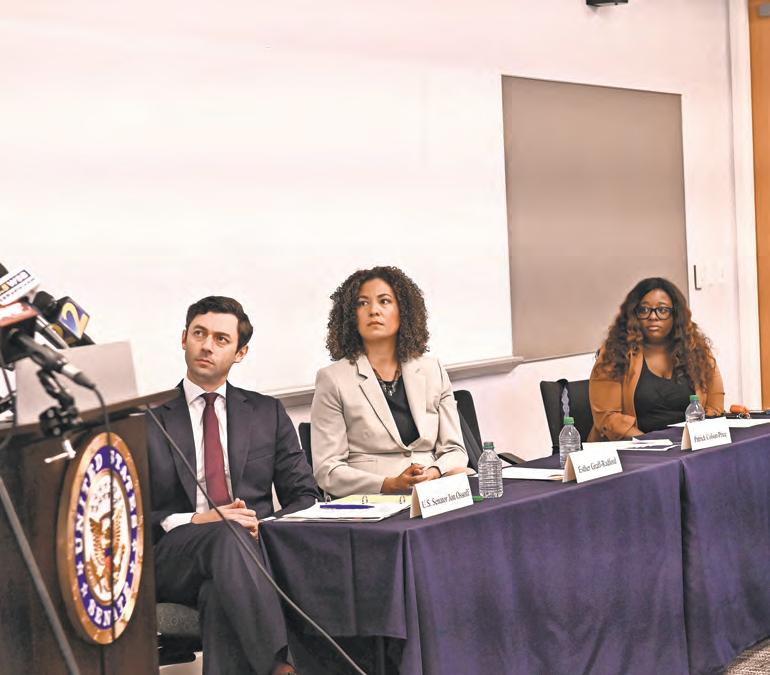

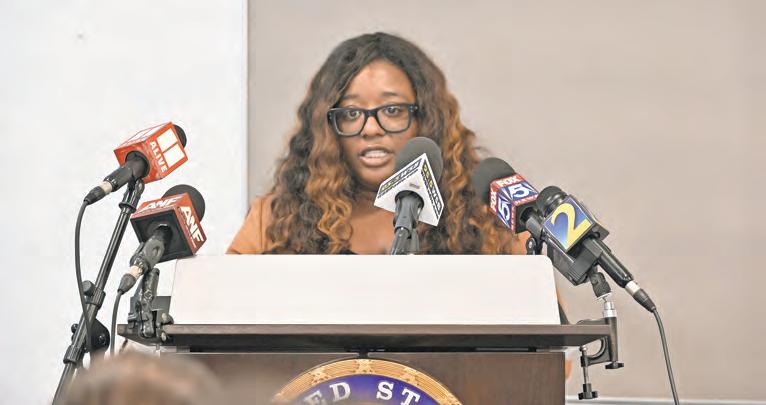

By NADIRA JAMERSON
Malcolm X burns in the imagination of Black artists — serving as a muse for poets, rappers, and filmmakers who channel his demands for justice and liberation. Now a bronze bust of the human rights activist in Nebraska’s Capitol — a space that once shunned its most famous native son — is one of the latest examples of his impact on both art and resistance.
Although he was born in Omaha, the child who would become El-Hajj Malik El-Shabazz only lived in the city for about a year. Due to harassment and violence from white supremacists, his family moved to Milwaukee.
“He only left at a young age because his family was chased out of Nebraska because of their world view on the philosophy that Black people should be equal and self-sufficient in this country,” JoAnna LeFlore-Ejike, executive director of the Omaha-based Malcolm X Foundation, said last May at the bust’s unveiling.
“Malcolm X, at least in Nebraska, has been seen as a controversial figure for a lot of reasons, in my opinion, that are completely ridiculous,” Nathran Murray, the artist behind the bust, tells Word In Black.
So Murray used his artistic abilities to tell the truth: “Malcolm X was a human rights leader who was trying to make the world a better place,” he says. “He had a lot of courage and integrity, to the point that he was speaking truth to power.”
It took Murray eight months to create the bust using bronze, water-based clay, rubber casts, sanders, and patina on the recessed areas to give the artwork an aged look.
Throughout his creative process, Murray says he worked closely with the Omaha-based Malcolm X Foundation — and one of Malcolm X’s six daughters, author and community activist Dr. Ilyasah Shabazz, who gave him a holistic and informed view.
Shabazz, who saw her father killed when she was just 2, “had a lot of input on how Malcolm X is perceived and how he’s been represented,” Murray says. “One of her comments was that people who have done him in the past have made him look angry with a big vein popping out of his forehead.”


Malcolm X and the Artistic Push for Black Pride and Power
The Nebraska State Historical Society’s announcement that it had chosen Murray to create the bust described the sculptor as a “socially engaged artist and educator” who “explores issues of race, ethnicity, and intersectionality, particularly how these aspects of identity are expressed in people and their stories.”
Through that lens, Murray is a modern-day torch bearer of the Black Arts Movement — a cultural push focused on Black identity and power, which began on Feb. 22, 1965, one day after Malcolm X’s assassination.
LeRoi Jones, later known as Amiri Baraka, headed to Harlem, where he founded the Black Arts Repertory Theatre, which hosted a variety of arts workshops. Baraka wrote that he wanted “to create an art, a literature that would fight for black people’s liberation with as much intensity as Malcolm X our ‘Fire Prophet’ and the rest of the enraged masses who took to the streets.”
The movement, which “emphasized self-determination for Black people, a separate
cultural existence for Black people on their own terms, and the beauty and goodness of being Black,” according to the Poetry Foundation, took off. By 1969, renowned poet Gwendolyn Brooks joined a group of writers to create “For Malcolm: Poems on the Life and the Death of Malcolm X,” honoring the civil rights leader’s life, assassination, and influence.
Painters of the time also centered Brother Malcolm in their work. In 1971, artist Wadsworth Jarrell, founder of Chicago’s AfriCOBRA movement, depicted Malcolm X in “Black Prince,” based on a 1963 photo. “At AfriCOBRA, we didn’t adhere to non-violence movements,” Jarrell told the Smithsonian Institute. “We adhered to more of the militant movements. Militant figures, like Malcolm X.”
In a 2017 interview with the Tate Modern, painter and Alabama native Jack Whitten explained that in his 1970 abstract painting “Homage to Malcolm,” he wanted to show that “Malcolm had a grasp of the universal aspect of the struggle that he was involved with. He knew that its that convergent into the universal that gave him more power.”
The triangle shape of the painting references Malcolm X’s visit to the pyramids. And, Whitten said, the “painting had to be dark, it had to be moody, it had to be deep, it had to give you that feeling of going back deep down into something. And in doing that, I was able to capture the essence of what Malcolm was about.”
Embraced by the Hip Hop Generation
Some critics argue that the Black Arts Movement died out in the 1970s, but Malcolm X’s influence on art thrived through hip hop.
The name and cover of Boogie Down Production’s 1998 album “By All Means Necessary” are a direct homage to Malcolm X. The group’s MC, KRS-One — which stands for Knowledge Reigns Supreme Over Nearly Everyone — dubbed himself as hip hop’s Malcolm X. And with lyrics like, “We’ve got to fight the powers that be” and “‘Cause I’m Black and I’m proud,” the 1990 release of “Fight the Power,” by hip-hop legends Public Enemy invoked Malcolm X’s spirit of Black pride, power, and activism.
Two years later, in 1992, Denzel Washington and Spike Lee introduced a new generation of young Black moviegoers to Malcolm X’s story and teachings — and inspired another generation of artists.
“Ryan Coogler told me his father took him to see Malcolm X when he was 6 years old. Sat on his knee. I’m not sure what you could comprehend at 6 years old, but he said that film made an impact,” Lee recently told Newsweek. Use Your Art to Serve the Community Since the sculpture’s debut, Murray says reactions to it have been “fantastic.” But the artist, who grew up in Lincoln, Nebraska, attributes the negativity about Malcolm X to the spread of law-enforcement-driven misinformation.
“A lot of it had to do with the COINTELPRO propaganda saying that Malcolm X was militant.” He was seen “as a domestic terrorist,” he says. ” That lingered in a lot of people’s minds — a lot of white people’s minds, mostly.”
The result of that propaganda: the nearly 20-year fight to get the civil rights icon inducted into the state’s Hall of Fame. But in 2023, Nebraska finally made Malcolm X its 27th member and the first Black person to be honored, commissioning the bust from Murray.
Since the unveiling, Murray says he “loved hearing people’s stories. I loved hearing how happy and honored people were. I loved hearing people say it was about time — that it should have happened 20 years ago.”
And he hopes future generations of Black artists will continue to be inspired by Malcolm X, know their own power, and continue to use their talents to serve their communities.
“Be authentic to your own truth. Be thoughtful about how it relates to the past, and how it relates to people like Malcolm X who dedicated his life to [resistance],” Murray advises. “What we have the most control over is what we’re doing in our own communities, the people we’re connecting with, the stories that we’re telling.”
By NOAH WASHINGTON
Spelman College celebrated its 138th commencement ceremony Sunday, May 18, at the Georgia International Convention Center, honoring the largest graduating class in its history. Nearly 700 graduates, family members, and guests gathered to mark the achievements of the Class of 2025, which included 446 Bachelor of Arts degrees, 248 Bachelor of Science degrees, and four valedictorians.
Interim President Rosalind “Roz” Brewer, who is a Spelman graduate from the class of ‘84, opened the ceremony by acknowledging the enduring legacy of Spelman alumnae, including the Golden Girl Class of 1975 and the Diamond Daughters, who were celebrating 55 to 70 years since graduation.
“We have in our midst women who are celebrating having graduated from Spelman 50 years ago. They are members of the Golden Girl Class of 1975,” Brewer announced to enthusiastic applause. “We also want to acknowledge women celebrating their 55th to their 70th year since graduation. Congratulations to the Diamond Daughters.”
Turning her attention to the graduating class, Brewer reflected on the unique journey of the students who began their collegiate careers amid a global pandemic in 2021.
“It was only a few short years ago that these intelligent, driven, enthusiastic women logged in for virtual New Student Orientation and started their first classes as Spelmanites,” she said.
“Throughout your matriculation at Spelman, you found community among your sisters. Through late-night study sessions, meals in the dining hall, many convocations, and engaging with your AUC peers,” Brewer said, “Whether you participated in Spelman’s prestigious study abroad program, academic research, or internships, you have made your mark.”
Among the proud attendees was Craig Parker from Moorestown, New Jersey, who traveled with his family to celebrate their daughter, Sydney Merren Parker, receiving her Bachelor of Arts in Economics. “We are extremely ecstatic about this,” Parker said. “The first thing we’re going to do as a family is have a nice group hug.”
“Class of 2025, you have persevered through unprecedented times,” Brewer added. “Today, we are filled with pride as we celebrate your hard work, strength, and numerous accomplishments. Carry with you the lessons and the memories that have been instilled in you and continue to pursue excellence in all your endeavors. We send you out into the world, confident that you have been cultivated with the ideals, the education, the persistence, and the passion to be the innovators and the global change agents that the world needs.”

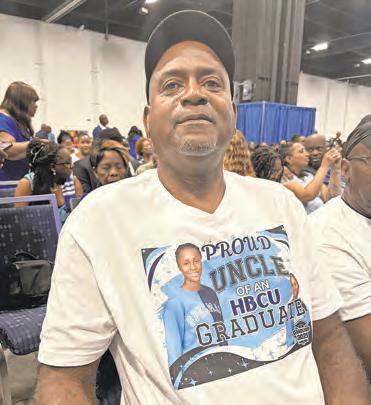
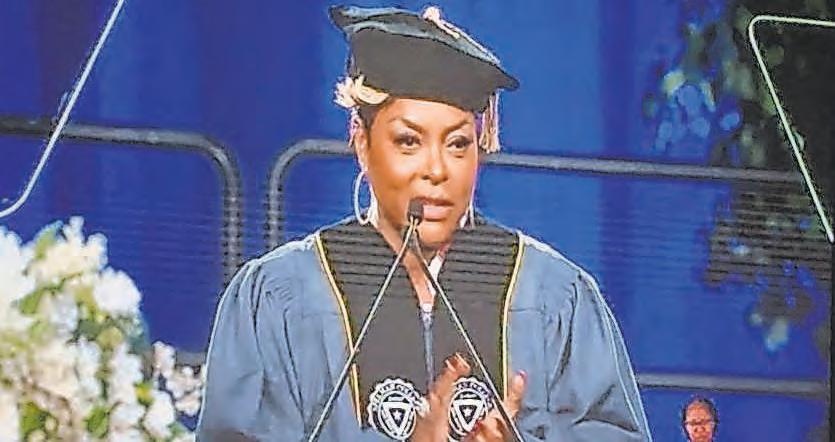
Lawrence Parker of Auburn, Alabama, also made the journey to honor his niece, Erica James, who graduated with a degree in Computer Science.
“We’re just excited to see her moving on to her new destination in life,” he said, proudly wearing a “Proud Uncle” shirt, with her face plastered on.
Academy Award-nominated actress and Howard University alumna Taraji P. Henson delivered the keynote address on Sunday.
Henson received an honorary Doctor of Fine Arts degree and emphasized the resilience and brilliance of Black women during her speech. She also urged graduates to recognize their power and the legacy they carry.
“You didn’t get here all by yourself,” she reminded them. “There are women in your lineage who are directly responsible for the seat you’re sitting in today.”
During her speech, Henson highlighted the symbolic significance of the number seven,
“Research shows we carry seven generations in our DNA.”
“This is epigenetics. The seventh generation can break cycles of trauma. You are standing between the past and the future,” Henson said.
Addressing the social and political challenges facing Black women, Henson delivered a rallying cry that brought the audience to its feet.
“Y’all better stop messing with Black women, because once we get up from this much-deserved rest. F--- around and find out”.
By ISAIAH SINGLETON
Centennial Yards Company recently announced its long-term lease with Cosm.
A leading immersive technology, media, and entertainment company, Cosm and Cenntennial Yards Company will work together to create a 70,000-square-foot, three-level immersive entertainment venue, including an 87-foot diameter 12K+ LED dome to deliver live sports and experiential entertainment in Shared Reality, as part of the Sports and Entertainment District at Centennial Yards.
Cosm offers fans a new way to experience live sports, immersive art, and experiential entertainment by merging ultramodern visuals with world-class hospitality and elevated food and beverage service.
Additionally, Cosm is the first addition to Centennial Yards’ next phase of development, which will bring approximately 470,000 square feet of entertainment, a two-story retail building, a Live Nation music venue, and restaurant space, including a 230-room flagship hotel, to a 7.5-acre site adjacent to the Atlanta Hawks’ State Farm Arena and Mercedes-Benz Stadium, home to the Atlanta Falcons and Atlanta United, as well as the Five Points MARTA station connecting the site with the rest of the city.
Centennial Yards Company is an affiliate of CIM Group, the developer of the $5 billion transformation of what was known as “The Gulch” into a massive 50-acre mixed-use development.
Working with award-winning architecture firm Gensler, who also designed the Signia by Hilton Atlanta, Cosm Atlanta will expand on the foundational design of Cosm’s first and second venues in Los Angeles and Dallas, respectively, and ensure its values and iconic features are embodied while still incorporating unique characteristics that reflect Centennial Yards and the Atlanta community at large.
Jeb Terry, president and CEO of Cosm, said there’s so much excitement around the development, and how Atlanta’s district is a premier sports and entertainment district, not just in the U.S., but in the world.
“Atlanta is a global destination, with the attention of the entire world, such as World Cups, Super Bowls, and more. We are going to be authentically Atlanta, it’ll be Cosm, but we will remain true to Atlanta, I promise you,” he said.
He also said the concept around the excitement is Shared Reality, which is bringing in “technology with the experience economy.”
Brian McGowan, president of Centennial Yards, also announced plans to bring a Live Nation venue to Cosm Atlanta.
“We’re building momentum and if you have been living under a rock, you may not know but we announced Live Nation is also coming to the venue where we will be building a 5,300 seat live music theater right here, which was signed two weeks ago, so we’re very excited about that as well,” he said.
Additionally, McGowan said they want to ensure they are building the “best sports-adjacent entertainment district in the world.”
“We want to make sure it’s the best, not in



the southeast, not in the United States, but in the world,” he said. “When people come down to Centennial Arts, we want them to have a different and unique experience every time they come here, and we have a lot of other great announcements that are coming, and we’re super excited about this.”
Andrew Saltzman, president of business enterprise and chief commercial officer of the Atlanta Hawks, said they are thrilled to add Cosm to Atlanta.
“This really marks the beginning of something that is transformational here in the city of Atlanta,” he said. “We are just so thrilled to be a part of that realization of what truly will be the world’s greatest sports entertainment district.”
He also said Cosm will provide what residents and guests have been asking for, which is a vibrant new entertainment option in the heart of downtown Atlanta.
“Cosm is going to provide a new immersive experience that will be new and exciting to our customers and will be available to our customers. We’re excited,” he said.
As far as job opportunities in Atlanta, Terry says they’ll be hiring “hundreds of people” at Cosm Atlanta and will have an excellent job impact, where it’s a bridge between technology, hospitality, and human experience once construction is finished.
“We typically keep about 200 plus base in each city that we come to, and some of that is built around the corporate kind of infrastructure we need in each city,” he said. “We also make sure we have a fantastic staff that’s driving and creating the hospitality environment
that we all aspire to have, so we look for a diverse talent base that comes in and understands how important this location is to us and the hospitality that we want.”
McGowan said there is a lot coming with the live entertainment venue as well and the economic impact will be “enormous.”
“We are going to build 2,000 – 3,000 apartments, 1,800 hotel rooms, 900,000 square feet of office, and 900,000 square feet of retail space. The economic impact is enormous, which will result in thousands of job opportunities for entrepreneurs to start businesses,” he said. “We have an online contract goal of 38 right now under construction, which is a $6 million project, so 38% of that will go to minority people, business enterprises, which is already changing lives, and there’s more to come.”
Furthermore, Terry said he wants people to come in Cosm Atlanta and have their minds blown.
“We want them to be wowed and speechless when they come in, but we also want them to leave and say, ‘I don’t know how to describe that, it’s just awesome, you have to see it.’ We really want guests to feel and have a wonderful time,” he said. “We want it to be an authentic experience”.
Terry also said their collective goal is to be finished in time for the 2026 World Cup, starting in June.
“I think there’s so much energy being put into it citywide; that’s the goal. We feel we’re in a pretty good spot, and we feel great about our progress,” he said.
By DONNELL SUGGS
The grand opening of the Atlanta Falcons and Atlanta United team store took place on Saturday, May 16. Atlantic Station remains the home for the store, which was originally located across the way from the Regal Atlantic Station movie theater, and is now across the street from one of the most popular businesses in the shopping and residential center.
The new Falcons/Atlanta United team store is now located across the street from Publix on 18th Street, SW, in suite 10100. Though the space is not bigger than the store’s previous home, it is in a prime location across the street from an anchor store and the only supermarket in Atlantic Station.
AMB Sports + Entertainment, the leasee, informed The Atlanta Voice that the timing for the move was more about the availability of the space than anything else. The space was previously home to one of the few brick-andmortar Gap stores in metro Atlanta.
Busy Bee Cafe, a longstanding Black-owned soul food restaurant located on MLK Jr. Drive,
near the Atlanta University Center, is moving its second restaurant into the former team store location.
“This move is about elevating the fan experience,” said Nisha Schmitt, vice president, retail, AMBSE. “With a larger footprint, extended hours, and an expanded product offering, our refreshed Team Store allows us to bring our fans even closer to the teams they love.”
On Saturday, Atlanta Falcons cheerleaders and Freddie the Falcon were on hand to greet customers and fans while a DJ played music.
The Falcons are celebrating 60 years of existence, and a number of special deals were put in place for customers, including $60 off any $150 purchase.
Atlanta United, only a few seasons away from celebrating a milestone decade in business, is scheduled to host the Philadelphia Union tonight at 7:30 p.m., and it has a deal for its fans as well. On Saturday, all jersey purchases were offered free customization. Customers were also offered the chance to enter a raffle for tickets to a match against Charlotte FC at Mercedes-Benz Stadium on Saturday, July 19.




By NOAH WASHINGTON
What started as a conversation between Hollywood heavyweights evolved into a documentary celebrating Black people in film.
“Number One on the Call Sheet: Black Leading Women in Hollywood” emerged from a collaboration that director Shola Lynch describes as essential to getting Black stories told.
“This film would not have been made without two Black production companies,” said Lynch, the Diana King Endowed Professor and Director of the Documentary Film Program at Spelman College.
The project’s genesis reads like a Hollywood script itself. Producer Datari Turner approached Jamie Foxx with the concept. “Jamie was like, ‘Ooh, that’s a good idea.’ Pitched it to Kevin Hart, ‘Ooh, that’s a good idea.’ They then went to Reginald Hudlin, and they sat around and said, ‘Great, let’s pitch it,’” Lynch recounted.
On April 21, 2021, it was announced that Apple acquired the films produced by Jamie Foxx for Foxx Hole Productions, Dan Cogan for Story Syndicate, and Datari Turner and Kevin Hart through Hartbeat. With their star power behind the project, the team secured funding from Apple. Executive producers Reginald Hudlin and Bryan Smiley were attached to both films, while Halle Berry, Viola Davis, Whoopi Goldberg, and Angela Bassett also came on as executive producers. Both women will appear in Part Two, which Shola Lynch directs.
Initially conceived as a single documentary, the team quickly realized the scope was too ambitious to cover both the men’s and women’s stories in one film. “They recognized that it’s too big to encompass both the men’s story and the women’s story in one film,” Lynch said. That realization led them to enlist Lynch, a seasoned documentary filmmaker known for her work on Shirley Chisholm and Angela Davis. “I wish it was my idea,” Lynch admitted with a laugh. “Listen, they went to Apple, who was like, ‘That’s a really good idea.’”
The documentary features interviews with 17 prominent Black actresses, including Whoopi Goldberg, Angela Bassett, Halle Berry, and Gabrielle Union.
“If you’re number one on the call sheet, guess what? You are busy,” Lynch noted. “It was really hard to get folks to sit down for us.”
The film’s title refers to the ranking system in filmmaking that positions lead actors at the top of daily production schedules.
“It means you’re the person that the narrative is about, you’re in a leadership position, and it is a ranking of high order in the world of acting and producing movies,” Lynch explained. “I was surprised when I looked into it. I was like,
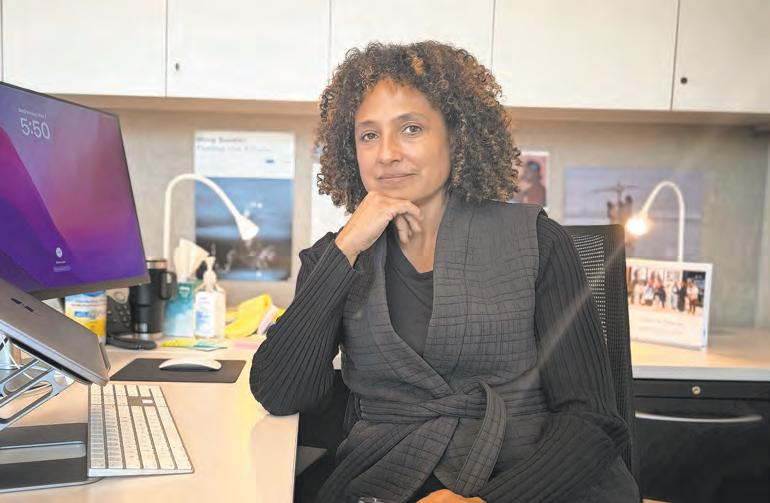
how many women are actually number one on the call sheet?”
The term became a metaphor throughout the film for Black women claiming their rightful place both in Hollywood and beyond.
“What became so clear is their personal passion and love for what they do,” Lynch said. “They are walking in their purpose, and that is really inspiring and energizing to see.”
Rather than standard promotional interviews, Lynch created an environment where these accomplished actresses could share experiences rarely discussed in public.
“The lights are dim. There’s one beautiful light. We set the stage. There’s a pastel color we choose for each woman. There’s a chair, literally a small table with flowers. We’re giving them their flowers,” she described.
This approach yielded unexpected vulnerability. “I was surprised at how many of the women said, ‘You know, no one’s ever asked me that,’” Lynch said.
She believes the key to effective interviewing is simple: “It’s just listening. In a conversation, you pay attention.”
The result was hours of profound conversation with each subject. “If we speak to everybody for an average of two hours, and we did 17 interviews, we got a lot of material,” she said.
Transforming these intimate conversations into a cohesive film presented significant challenges. “We had 17 interviews, and I didn’t want the film to be a hierarchy of star status, but an ensemble,” Lynch explained.
With more than 200 films referenced or clipped in the documentary, editing became
the most time-consuming aspect of production.
“We edited for a long time,” Lynch said. “We would have to stop and start. We’d have to get more interviews.”
Like most filmmakers working with studios, Lynch navigated the balance between artistic vision and corporate expectations.
“Apple is a corporation, and they have corporate needs and metrics, and executives give you notes. That’s the real world,” she said. “The most important thing you can do is finish the project and have something that you feel proud of with your name on it.”
Lynch, daughter of Columbia University history professor Hollis Lynch, brought an academic perspective to the project, placing today’s Black actresses in historical context.
“Hattie McDaniel wins Best Supporting Actress. She’s the first Black woman to win an Academy Award,” Lynch said, discussing “Gone With the Wind.” “Do you think that’s the only role she ever wanted to play?”
“What became so clear is their personal passion and love for what they do. They are walking in their purpose, and that is really inspiring and energizing to see.”
Shola Lynch
The film shows McDaniel’s many maid roles, with dates centered on screen. “It’s not about her; it’s about how many years, how many roles in which she played a maid. We can imagine that she would have liked more opportunities as well.”
Several moments in the film highlight how these actresses navigated limited opportunities. Lynch described Whoopi Goldberg’s strategic approach in the 1980s after a reporter suggested she couldn’t be a leading actress.
“He says to her, ‘Well, you can’t really be a lead actress. You can wear a blonde wig, but you can’t be a blonde. You can pretend to be beautiful, but you can’t really be,’” Lynch recounted. “Her response is everything, because she’s like, ‘Well, in my mind, I can.’”
Rather than forcing new projects, Goldberg found already-greenlit films where the original star had left. “She did a film that was supposed to be for Bette Midler, a film that was supposed to be for Bruce Willis, a film that was supposed to be for Cher. She was creating a career and a body of work that would propel her forward.”
Lynch’s own journey to directing wasn’t direct. With a master’s in public history & resource management, she initially wanted to be a curator.
“I couldn’t find a job. There were all these cutbacks in the arts when I came out of graduate school,” she said. This led her to Ken Burns’ company, Florentine Films, where she worked for five years.
“I fell into filmmaking, and my graduate school for filmmaking was working with all of the incredible people at Florentine Films,” she explained. “After five years, I turned around to myself and I was like, ‘Shut up or put up, make a film. Let’s see if you’re a director.’ And that is how the Shirley Chisholm film came to be.”
When asked about the film’s intended audience, Lynch was clear: “I wanted the film for me. And then I feel like as a maker, if it works in terms of my artistry and vision and I buy in, then it will translate.”
She hopes the documentary will have a lasting impact. “I would love for it to be timeless,” she said, noting that her 2004 Shirley Chisholm documentary is still screened in classrooms.
“Fundamentally, as Black people in the United States of America, we’ve been robbed of our history,” Lynch said. “What the film does is these are the aunts and uncles you wished you had, and they’re sharing their personal stories through the film, and we can learn from that.”
Lynch concluded with the question she hopes viewers will ask themselves after watching: “Are you number one on your call sheet?”
By DENNIS MALCOLM ByRON AKA ALE SHARPTON
Ialready had a good idea what I was going to get with the 2025 Nissan Rogue Platinum AWD because it is one of those go-to crossover SUVs that has stood the test of time. The brand’s consistency of combining comfort, tech, and value with the ability to take on various road conditions maintains its longevity. Produced in various trims, the Platinum is the top-ofthe-line version gifted with numerous amenities leaving virtually every demand addressed. My review model was presented in a bold “Deep Ocean Blue” exterior, complemented by 19-inch alloy wheels, and signature LED lighting on a more futuristic, sleek frame.
Under the hood, the Rogue Platinum features a more-than-adequate 1.5-liter Variable Compression Turbo engine, kicking out 201 horsepower and 225 lb-ft of torque for extra pep. Paired with Nissan’s Xtronic CVT, it provides smooth, efficient acceleration and earns an impressive 31 miles per gallon, keeping gas station visits minimal whether you’re running through city streets or heading off the beaten path.
Inside has a nice touch of luxury to warrant the “Platinum” label, including ambient lighting and quilted semi-aniline leather-appointed seats presented in premium chestnut

brown paired with the leather-wrapped heated steering wheel. The BOSE premium audio system delivers crisp, immersive sound to make any excursion that much more enjoyable. Passenger comfort is also a priority with the Rogue, with tri-zone automatic temperature control, heated front and rear seats, and second-row sunshades. The panoramic moonroof brings in optimal natural light, enhancing the premium chestnut-colored interior, and the wireless charging pad raises the cool factor.
Gadget lovers will appreciate the tech suite that rivals brands costing significantly more
By NOAH WASHINGTON
Kerry Washington, no stranger to high-stakes, action-oriented storytelling — from her lead role in ABC’s Scandal to her turn as a damsel in distress in Quentin Tarantino’s Django Unchained — Washington brought star power to the Plaza Theatre on Sunday, April 27, for a special screening of her latest film, Shadow Force, during the 49th annual Atlanta Film Festival.
Before the film’s screening, Washington was presented with the Ossie Davis award with an introduction from the star of Hulu’s Reasonable Doubt, Emayatzy Corinealdi, for which Washington serves as the executive producer, working with former writer and producer for Scandal Raamla Mohamed.
Directed by Joe Carnahan, Shadow Force is an action thriller that stars Washington as the assassin-turned-mother Kyrah, alongside her husband, Isaac, played by French Lupin star Omar Sy. The film also features an ensemble cast including Mark Strong, Da’Vine Joy Randolph, and Cliff “Method
Man” Smith.
The story centers on Kyrah and Isaac, former leaders of a multinational special forces unit who defy the rules by falling in love. Forced to go underground to protect their son, Ky, played by Jahleel Kamara, as the couple face off against their former comrades.
Before the screening, Washington spoke to the attending audience about how she was tired of playing the Black best friend in action films such as the 2005 Mr. & Mrs. Smith, in which she played Angelina Jolie’s best friend — a film to which Shadow Force will inevitably draw comparisons.
“For some people, it’s all about Black love. For others, it’s about family, or fighting against systems that don’t support you,” she said. “Primarily, I want people to have fun — to go on an adventure and escape whatever they need to for a little while. But when they leave, I hope it’s a reminder to hold on tight to what matters most, to fight for the people you love — and not with guns — but to stand up for who and what you love.”
Shadow Force has been in development
to drive off the lot. A 12.3-inch digital dashboard and 12.3-inch color touchscreen display set the tone, integrating Google Built-In, Alexa, wireless Apple CarPlay, and Android Auto. To add, the ProPILOT Assist 2.1 uses Google built-in and gives drivers the opportunity to conduct the SUV with hands off the steering wheel while on a highway’s single lane; amazingly, it also handles acceleration, steering and even braking. Yes, it’s semi-autonomous driving functionality at its best, and ideal for long drives or rush hour traffic bustling cities like Atlanta are notorious for.
On the safety side, Nissan the Rogue
Platinum has the Nissan Safety Shield 360 coming standard with a plethora of advanced features, including automatic emergency braking with pedestrian detection, blind spot intervention, and rear cross-traffic alert to name a few. The 360° HD Enhanced Intelligent Around View Monitor is a true standout as well when it comes to high-tech visibility. It boasts two new enhancements this year; the “Front Wide View” provides a 176-degree view for a more advanced look to detect street obstacles, while the all-new “Invisible Hood View” gives drivers a necessary eye under the engine to avoid annoying hindrances like high curbs.
To keep the mind at ease, Nissan’s maintenance care program includes three scheduled oil changes within the first two years or 24,000 miles at no extra charge.
At about $48K as tested, this fully loaded Rogue Platinum AWD brings us opulent appointments, seemingly countless safety applications coming standard, and overall serious value in the premium compact SUV segment. Nice job, Nissan.
Fuel Economy: 28 city/34 highway/31combined
Price: The 2025 Nissan Rogue starts at $40,920, and the Platinum AWD is $47,330 including the Platinum Premium and Technology Packages.
For more information, visit Nissan.com.

since 2019, when Washington’s production company, Simpson Street, along with Sterling K. Brown’s Indian Meadows and Steven “Dr.” Love’s Made in Love Media, acquired the original script by Leon Chills. Lionsgate later picked up the film for distribution.
After the screening, Washington participated in a post-film discussion with the audience, where she expanded on the film’s central themes.
“There’s so much power in allowing
yourself to be part of a great team,” she said. “Parenting, and really life in general, isn’t meant to be done alone. Whether that team is a spouse, a grandparent or a sister, it’s about building your village.”
Speaking to the crowd, Washington highlighted the film’s messages, “This film is primarily a big, fun, splashy action adventure,” Washington said, “But at its heart, it’s about family and about love — and the sacrifices we make for the things that matter most to us.”
By ITORO N. UMONTUEN
Democratic House Chair Tanya Miller discussed the challenges of leadership as the Minority Party, likening it to competing in a championship game. One can stew over disappointment or discover growth after suffering losses. In her case, she was overjoyed when the Ohio State Buckeyes won their seventh National Championship in January, in Atlanta. However, upon completing her third year in the Georgia General Assembly and her first in party leadership, Miller reflects on the long days and nights at the State Capitol.
“As far as leadership goes, it has been such a tremendous, I would say, a blessing to me,” Miller describes. “When you’re a caucus leader, you are essentially a leader of leaders. And so it is a demanding position. but you have to grow in the art of cooperative work. The art of persuasion, learning to listen. It is a true team sport amongst some of the best and the brightest.
I’d be lying if I said it was easy. It’s probably one of the hardest things I’ve done in a long time in my career, a trial lawyer. So I try cases. I’m used to high stakes. I am used to hard charging. I’m used to scrapping it and duking it out over long days and long nights. But, this is certainly different, different in a good way. I’m grateful for the growth that it has allowed me to undergo as a leader, a young leader.”
There is a rumor that if Congress passes a budget that severely defunds the Department of Education, Georgia will face a shortfall in its education budget. If that were to happen, a special session may be called later this year to pass a supplemental budget or a continuing resolution. Miller acknowledges the potential need for a special session to fully fund the state’s Quality Basic Education formula. She also believes a special session would be the route to finally modernize the 40-year-old equation.
“Essentially, the way that we fund public education is old and it is outdated,” Miller explains. “It does not take into account the relative poverty of the children and the communities where the schools lie. If you truly believe that a child’s zip code should not determine the trajectory of their life, then you have to take into account the reality of the economics surrounding the child in the community
when you find it right now. The formula that we use to fund public education doesn’t do that. This is a priority for Democrats.”
Additionally, Miller believes a proverbial special session will be the time to address the Georgia Promise Scholarship program. Currently, the 2026 budget includes more than $141 million to launch it. This school choice program offers eligible students $6,500 in public funds for use on non-public education expenses in grades K-12. Miller believes it will be the perfect moment to scale back the program or take it one step further.
“We have to scale [it] all the way back, if not dismantle the school voucher program,” Miller says. “It’s not going to be effective. It will not work, and it is poorly constructed. As we’ve seen in the implementation of it, it’s going to be more costly than they ever anticipated or imagined.”
DPG Elections and Miller’s support of Charlie Bailey
Miller says Bailey recruited her to run for office in 2022. During our conversation, she praised Bailey’s election as DPG chair on May 3rd, highlighting his loyalty and support over the years.
“It was just really an extraordinary group of dedicated public servants who offered themselves up to lead our party at this important time,” Miller says. “And I am not saying this to diminish any of them. I frankly think any one of them would have done a great job in their own right, I’m sure. The momentum and the support that Charlie had, I think ultimately, is evidence that he is the person who says what he means, means what he says. And when he’s on your side, you can take that back to the bank and cash it. So I was personally very, very excited to see him take that role.”
Bailey’s loyalty and steadfastness as a friend and leader came to the fore during the special prosecutor saga which embroiled Fulton County District Attorney Fani Willis. Bailey backed Willis, during the hearings, while the proverbial block was at its hottest.
“When a lot of people didn’t want to stand up and speak on her behalf, Charlie was out front,” Miller said. “And that’s who he is as a person.”
Miller believes Bailey is central to the House Democrats’ mission to reach 91 seats in the General Assembly, the simple majority needed to pass legislation.
“We intend, as Democrats, to run our next elections as if there were 159 counties where
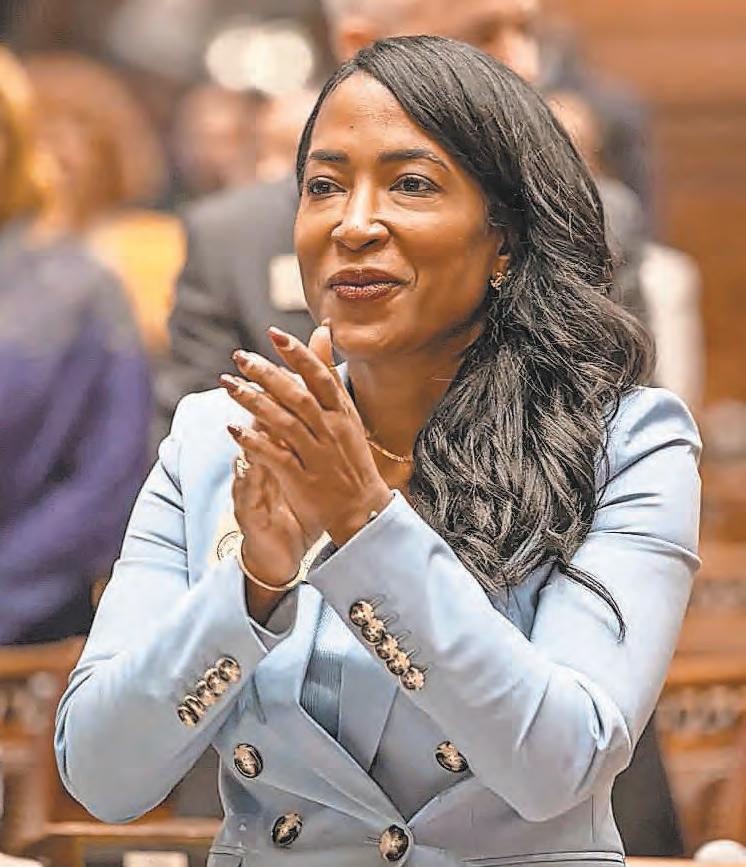
“Essentially, the way that we fund public education is old and it is outdated. It does not take into account the relative poverty of the children and the communities where the schools lie. If you truly believe that a child’s zip code should not determine the trajectory of their life, then you have to take into account the reality of the economics surrounding the child in the community when you find it right now. The formula that we use to fund public education doesn’t do that. This is a priority for Democrats.”
Tanya Miller Democratic House Chair
Democrats need to show up, go out and win,” Miller said. “So there will be a statewide, omnipresent campaign for Democrats all across the state and from the top of the ballot to the bottom.”
Georgia can be the ‘prototype’ for change Miller believes Georgia must be the best place to live, work, raise a family, and get educated while receiving affordable, excellent, and great healthcare. While sharing her excitement about OutKast’s induction into the Rock and Roll Hall of Fame, Miller says, “Prototype”, from 2003’s “Speakerboxxx/ The Love Below” is her favorite song. The
transplanted Peach from Cleveland, Ohio believes she can help Georgia do something out of the ordinary, like catch a matineé.
“You have this one life to live, God gave you whatever talent He gave you. I don’t really sing that well,” Miller admits. “I mean, I’m like a choir singer, but I’m not like a solo singer! But, he just gave me tenacity. He gave me the ability to empathize with people, to put myself in their shoes, and to stand out in front and fight for them. That’s my talent and I am just so grateful He has seen fit to give me the opportunity to use that talent. To honestly, to glorify Him and to do good in the world for the people.”
By DONNELL SUGGS
Atlanta United will continue a three-game homestand on Sunday night when FC Cincinnati comes to Mercedes-Benz Stadium.
Last Saturday, against the Philadelphia Union, Atlanta United was back at Mercedes-Benz Stadium for the first of those three matches (FC Cincinnati and rival Orlando City will be next). There couldn’t have been a better time for a reeling Atlanta United side to pick up points, momentum, and good vibes. And for all intents and purposes, the match started off on the right note. The 1-0 loss feels like a defeat because it is, but there’s more to the match than the overall result.
Play one: Matt Edwards didn’t have any near misses on offense, but might have made the biggest play of the game on defense. Edwards blocked a clear shot at the Atlanta United goal in the 40th minute. It was one of the few clear shots the Philadelphia Union took during the first half. Edwards, not the most demonstrative player on the team, pumped his fists as the ball went out of bounds.
Play two: The second half of the match saw Luis Abram make the first gaffe of the match when his sliding block of a Philadelphia shot grazed his hand. The handball call resulted in a penalty kick and goal for the Union’s leading goal scorer Tai Baribo. The only goal of the match came in the 59th minute and was Baribo’s

11th of the season. That goal simultaneously ignited a fire under Baribo’s teammates and let all of the air out of The Benz. Up to that point, the momentum was on Atlanta United’s side.
The plays from Edwards and Abram can be seen as moments of passion and fight. This team is not quitting, says manager Ronny Deila, but they do have to fully understand the
position they are in at the moment.
“We have to accept the situation,” he said during his postgame press conference on Saturday.
Atlanta United still hasn’t won a match since March 29, when they defeated New York City FC 4-3. That was eight matches ago.
Once again, Atlanta United manager Ronny Deila tinkered with the starting XI for Saturday’s match. This first-year manager for Atlanta United put Matt Edwards, Jay Fortune, Tristan Muyumba, and Jamal Thiare, the goal scorer during the 1-1 draw at Austin, on the pitch. There was an extra surge of energy with those players on the pitch against Philadelphia. He might want to keep the same energy against Cincinnati.
Leading goal-scorer Emmanuel Latte Lath and Saba Lobjanidze both came off the bench against Philadelphia.
In the locker room following the loss on Saturday, both Edwards and Fortune used the word “frustrating” when describing the team’s current state of affairs.
During training this week, the team looked energetic during workouts and drills. Several players talked to the media after practice. Everything looks like nothing’s wrong, and the only two victories they have had this season were against Montreal and NYCFC, the former being dead last in the Eastern Conference.
“I’m here to build something, and that’s what I’m going to do,” Deila said.

By DONNELL SUGGS
The Atlanta Dream are back home. Following Thursday night’s season opener against the Indiana Fever at State Farm Arena, the Dream will host consecutive home games over the Memorial Day weekend.
The Dream started the 2025 season on the road with games at the Washington Mystics and the Indian Fever on May 16 and 20, respectively. On Saturday and Sunday, the Dream is hosting the Dallas Wings and Connecticut Sun.
Atlanta’s bench will play an important part in whether or not new Dream center Brittney Griner wins another WNBA championship. Guards Maya Caldwell, Shatori Walker-Kimbrough, and forward Nia Coffey won’t score in significant numbers, but that’s not what any of the three players are on the team for. So far this season, Caldwell and Walker-Kimbrough have provided much-needed ball-handling when Allisha Gray and Rhyne Howard, the starting backcourt, aren’t in the game. Coffey’s defense and rebounding will keep her on the court this season. On
Tuesday night at Indiana, Coffey, who failed to score in the game, blocked one of the two final shot attempts by the Fever in a 91-90 victory. Coffey also added five rebounds and three assists during the game.
Through the first games of the season, the ball has gone into the post more with Griner and Brionna Jones on the roster.
That is a change from depending on Howard and Gray to have big shooting nights like in the past.
Following Tuesday night’s win at Indiana, Dream head coach Karl Smesko called the bench “huge.” So did Griner.
“We needed everybody tonight,” Griner said. “Being able to use everybody and everybody being locked in is huge.”
On the fact that there were only 12 points off the bench (Walker-Kimbrough 5, Caldwell 4, Naz Hillmon 3), Griner said, “We needed all of those points.”
Following the homestand, the Dream will play three consecutive games on the road in Los Angeles, Seattle, and Connecticut. The game against the Sun will be the second time the team’s will have faced off in two weeks.
By MICA WHITFIELD
If this administration wants to push for a “baby boom,” it must first fix the broken system families are forced to navigate. Because without the care and resources we need — it’s not a boom, it’s a bust.
There were a few years after I gave birth that I couldn’t work full time — not because I didn’t want to, but because with the cost of child care we wouldn’t break even. Like so many other mothers, I weathered the storm. I worked gig jobs and found child care through friends or family, while stretching every dollar.
I re-entered the workforce full-time, determined to do work that matters to women like me. Women who are kept out of the workforce and crushed under the weight of a system that prioritizes billionaires over working families. A system that leaves us women, especially women of color, navigating career paths that are anything but linear, juggling dreams with daycare costs, and who are told to “just figure it out” without any real support.
The Financial Burden Families Face
When I saw that the Trump Administration is proposing a $5,000 “baby bonus” to
encourage people to have more children, I was appalled. Not by the idea of helping families — because we do need help, and we need it fast — but by how unserious the solution is. Because let’s be honest: $5,000 doesn’t come close to covering the cost of giving birth, let alone raising a child. It’s an insult to the real financial burden families face.
Childbirth in the U.S costs around $19,000 before insurance. Without insurance, that bill can exceed $30,000, and if there are any complications, it can be even higher. On top
of that, infant care in many states costs more than $15,000 a year. That’s daycare, diapers, formula, medical visits, and all the baby gear you suddenly can’t live without.
And the financial strain doesn’t stop there. We see it in lost wages, missed promotions, and the part-time jobs we are often forced to take because the workday doesn’t align with the demands of raising a child.
Meanwhile, the very same administration is actively destroying programs that working families of color survive on, like Medicaid, which funds about 41% of all births in the U.S. and, Head Start, which provides child care and meals to children.
Pushing this “baby bonus” alongside programs that teach us about our menstrual cycles is entirely backwards. We’re not addressing the real issues that impact maternal and child health. For instance, why are we not teaching about prenatal care or the importance of dental care during pregnancy — something many people don’t think about? Why isn’t there more education around perinatal mood disorders, postpartum depression, or the risks of preeclampsia and gestational diabetes, which are far too common and dangerous?

Credit: Leicarras
We need to focus on making pregnancy and parenthood safe and more affordable for everyone. The U.S. has some of the highest maternal mortality rates of any developed country, with Black women’s maternal death rates that are three to four times higher than those of white women. In Georgia, where 9to5 works to fight for working families, the pregnancy-related death rate ranks among the worst in the nation. And these deaths are preventable.
Let’s not forget the failure of our child care system for both parents and providers. Child care is unaffordable, and those who care for our children are underpaid and overworked. Until we tackle these real solutions, any attempt to “boost birth rates” is just harmful neglect and shows no real concern for working families.
The Lasting Changes
We Need to Start With
• Paid family leave that allows parents to show up for their families without risking their jobs or paychecks.
• Affordable child care that doesn’t drain family budgets or force parents to choose between work and care.
• Workplace policies that support parents, offering flexible hours and remote work options
• Lowering maternal mortality rate by addressing the disparities that exist for women of color.
• Expanded access to high-quality, affordable health care for everyone who chooses to become pregnant, and so much more. The real solutions are right in front of us, and we’ve been demanding them for years. All we need is for those in power to listen — to actually hear the voices of the people who are living these struggles every day.
Mica Whitfield is a co-director at 9to5 and is based in Atlanta.



